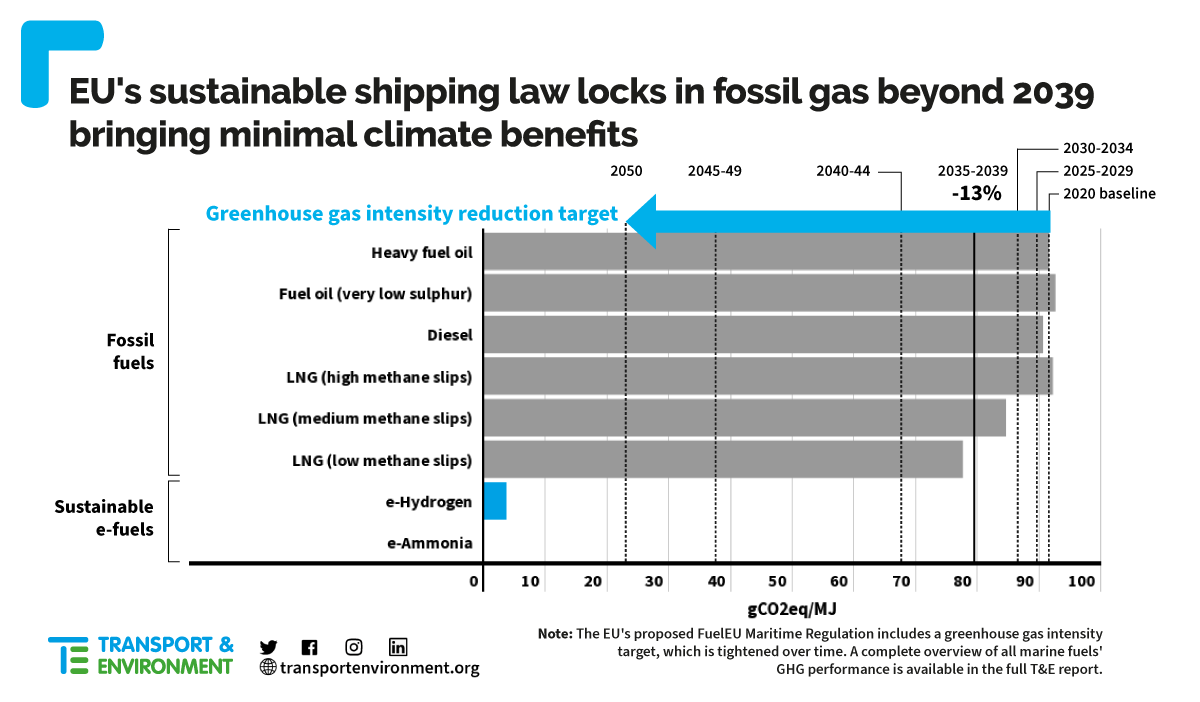Misguided EU Sustainability Targets Will Lock In LNG For Decades
EU policies to clean up shipping will lead to replacement of conventional marine fuels with fossil liquid natural gas (LNG), with little benefit to the climate.
A quarter of Europe’s shipping will be fossil gas-powered by 2030 as misguided EU sustainability targets encourage an uptake of LNG, a new Transport & Environment study shows. This will lock in fossil fuel use for decades while bringing limited benefits to the climate, says T&E.
Delphine Gozillon, sustainable shipping officer at T&E, said: “The shipping industry is one of the world’s biggest polluters and is heavily reliant on fossil fuels. The old narrative of gas as transitional fuel just doesn’t hold. We cannot afford to shift from one fossil fuel to another. It will not get us to zero emissions by 2050 and, by putting more methane into the atmosphere may even fry the planet faster.”
Last year, the European Commission proposed a law requiring ship operators to reduce the lifecycle carbon footprint of the fuels. The EU targets, which are tightened over time, are designed to gradually squeeze out the most polluting oil-powered ships, and, in theory, drive the uptake of sustainable fuels.
Instead, they will be replaced by fossil LNG-powered ships, which the regulation gives the green light to well into the 2040s. According to the report, with costs far cheaper than genuinely clean alternatives, LNG will make up 23% of the total energy used in EU shipping by 2030, up from 6% today¹. Many of today’s LNG ships are worse even than the traditional ships they replace².
As the Commission proposal stands, ships will have little or no incentive to switch to more sustainable alternatives such as green hydrogen or hydrogen-based fuels known as “e-fuels.” Currently there is no mandate for e-fuels, meaning shipowners can rely on fossil LNG and dubious biofuels to meet EU targets into the 2040s.
Delphine Gozillon concluded: “Europe’s policymakers should introduce dedicated quotas and incentives to boost demand for hydrogen-based fuels. Genuinely clean solutions do exist, but currently they are expensive. If we kick start demand now, a green shipping future is possible. Continue to waste precious time on fossil gas and it will start to look impossible.”
T&E recommends mandating a 6% target for shipping e-fuels by 2030 as the most straightforward way to ensure supply and demand for sustainable fuels, while providing business predictability to shipowners and fuel suppliers. Without this minimum share of e-fuels and stricter greenhouse gas targets, full decarbonisation by 2050 will likely be out of reach.
The EU’s shipping fuel law — FuelEU Maritime — is currently under discussion in the European Parliament and the Council, with a final text expected in the second half of 2022. T&E calls on policymakers to adopt key changes to the proposal.
¹ T&E’s modelling is based on ship order books for ships until 2023 with future LNG ship sales assumed based on the increase due to fuel oil being no longer compliant with the regulation anymore. LNG is the cheapest among alternative fuels.
² About 80% (79%) of LNG burned today is burned in an engine (low-pressure 4-Stroke) with worse Well-to-Wake GHG emissions than traditional engines running on dirty fuel oil. If methane’s short-term global warming effects were accounted for, only the lowest-methane slippage engines would comply with FuelEU Maritime’s GHG targets. Estimation of the fuel consumed by LNG-powered ships in the 2020 MRV fleet is based on fleet characteristics data from IHS.
³ The target for the period 2035-2039 requires only 13% GHG reductions compared to 2020. If shipping is to decarbonise by 2050, this means the remaining 87% of GHG reductions will have to take place between 2040 and 2050.
Originally published on Transport & Environment.
Related Stories: Climate Impact Of Exemptions To EU’s Shipping Carbon Pricing

Chip in a few dollars a month to help support independent cleantech coverage that helps to accelerate the cleantech revolution!
Have a tip for CleanTechnica? Want to advertise? Want to suggest a guest for our CleanTech Talk podcast? Contact us here.
Sign up for our daily newsletter for 15 new cleantech stories a day. Or sign up for our weekly one if daily is too frequent.
CleanTechnica uses affiliate links. See our policy here.
CleanTechnica's Comment Policy

